College of the Environment Newsletter - Fall 2023
From the Dean’s Desk
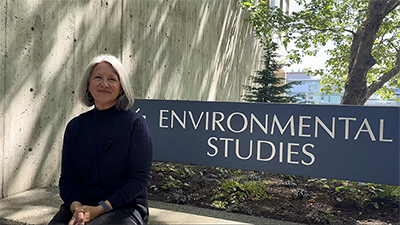
We are excited to share news from the College of the Environment with you! Over the last few years, our faculty have dramatically increased the research footprint of our college. Faculty are bringing their expertise to regional, national, and international collaborations that bring community organizations, federal and state agencies, Tribal partners, and academic institutions together to understand and address a variety of complex, and increasingly urgent, environmental challenges. The research of our faculty expands opportunities for graduate and undergraduate students. It also enhances the applied and solutions-oriented thinking our faculty bring to the wide array of spaces where our students learn— in lab and fieldwork, in studios and classrooms, and in internships and community projects. The results? Our students are doing some amazing things. Here are just a few recent highlights:
- Last spring, Learning Environment Action Discovery (LEAD), led by Environmental Studies graduate students Ava Stone and Brandon McWilliams, collaborated with community organizations and the City of Bellingham to build a mini forest on a small, overgrown lot on the north end of campus.
- A team of students, advised by Dr. Troy Abel, won third place in the first phase and honorable mention in the second phase of the EPA’s Environmental Justice Video Challenge for a community-involved project that used data mapping to identify sources of air pollution in a South Seattle neighborhood.
- Gil Gepte, an Urban Planning major who graduated in June, was honored as one of seven 2023 Presidential Scholars.
- Elena King, who graduated in June with a degree in Environmental Sciences, received a Sustainability, Equity & Justice Fund (SEJF) grant through the Sustainability Institute to support quarterly community-building events for underrepresented students in Environmental Sciences.
This last example represents something especially important to us. The College of the Environment is committed to increasing student access and creating a welcoming, respectful, and inclusive space for learning. Community provides the infrastructure for people to work together across differences and do difficult things. But community doesn’t magically appear; it takes effort and requires investments of time, energy, and resources. To this end, we will continue to focus on programs, speakers, and collaborations that bring people together, spark curiosity, and support our students’ education and development as environmental leaders.
Teena Gabrielson,
Dean of the College of the Environment
Introductions
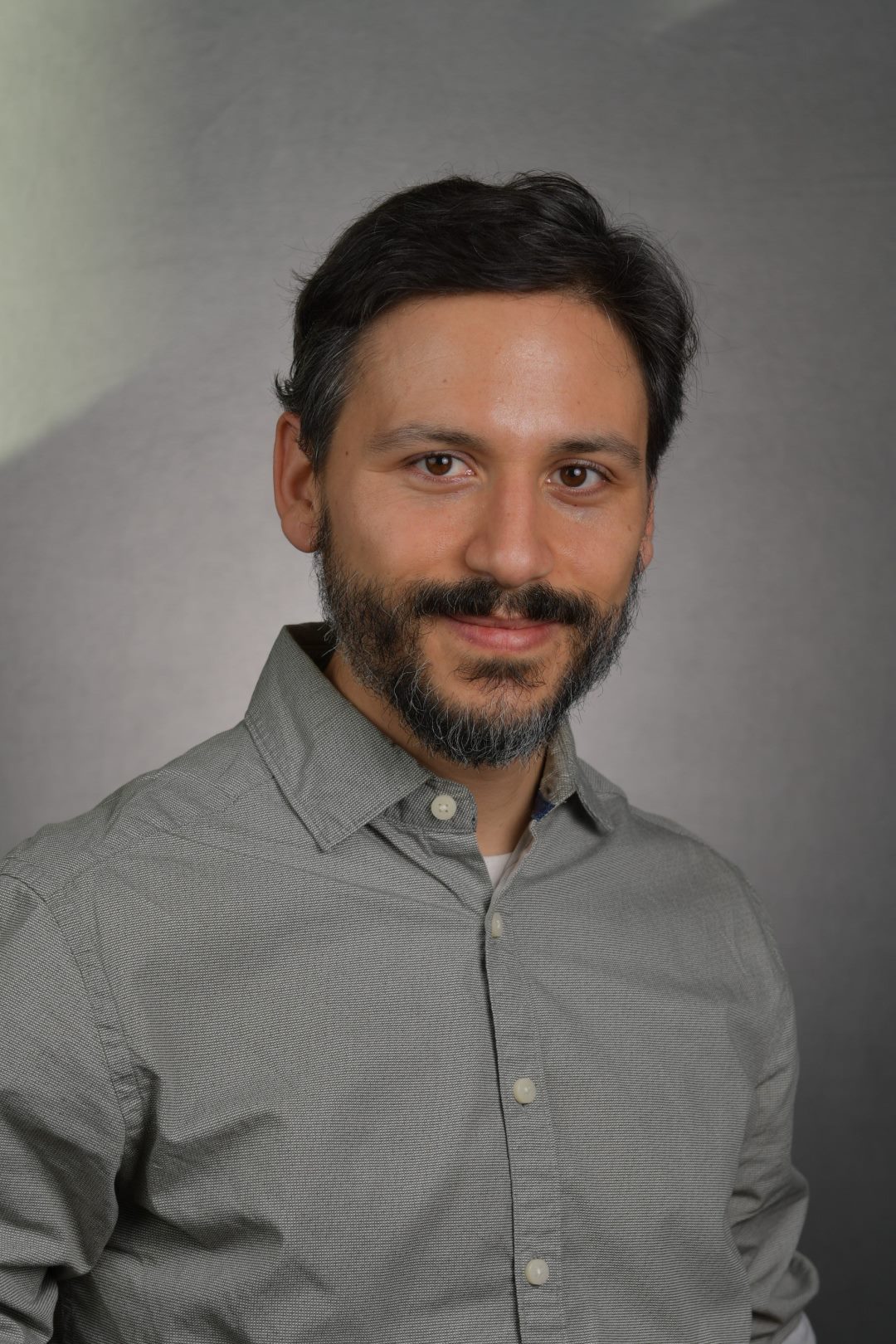
The College of the Environment welcomes Dr. Francisco Laso
The College of the Environment is excited to welcome Dr. Francisco Laso, Assistant Professor in the Environmental Studies department! He arrived at Western as a visiting professor last year but now joins us full time. Dr. Laso received a Ph.D. in Geography from the University of North Carolina at Chapel Hill, where his doctoral research looked at the interconnections between agriculture, wildlife, and conservation in the Galápagos Islands, work that continues to interest him today. Since arriving at Western, he's taught GIS (Geographic Information Systems), cartography, intro to research methods, and “Extractivism and its Alternatives in Latin America” with the Honors College. Dr. Laso received a Diversity and Social Justice Grant to lead a new participatory mapping project, “Mapping Access and Disability at WWU,” to visualize barriers and highlight areas around campus without obstacles.
Read more about Dr. Laso's projects, a collaboration on a cultural inventory of the Galápagos, and how a trip this summer led to a unique research opportunity.
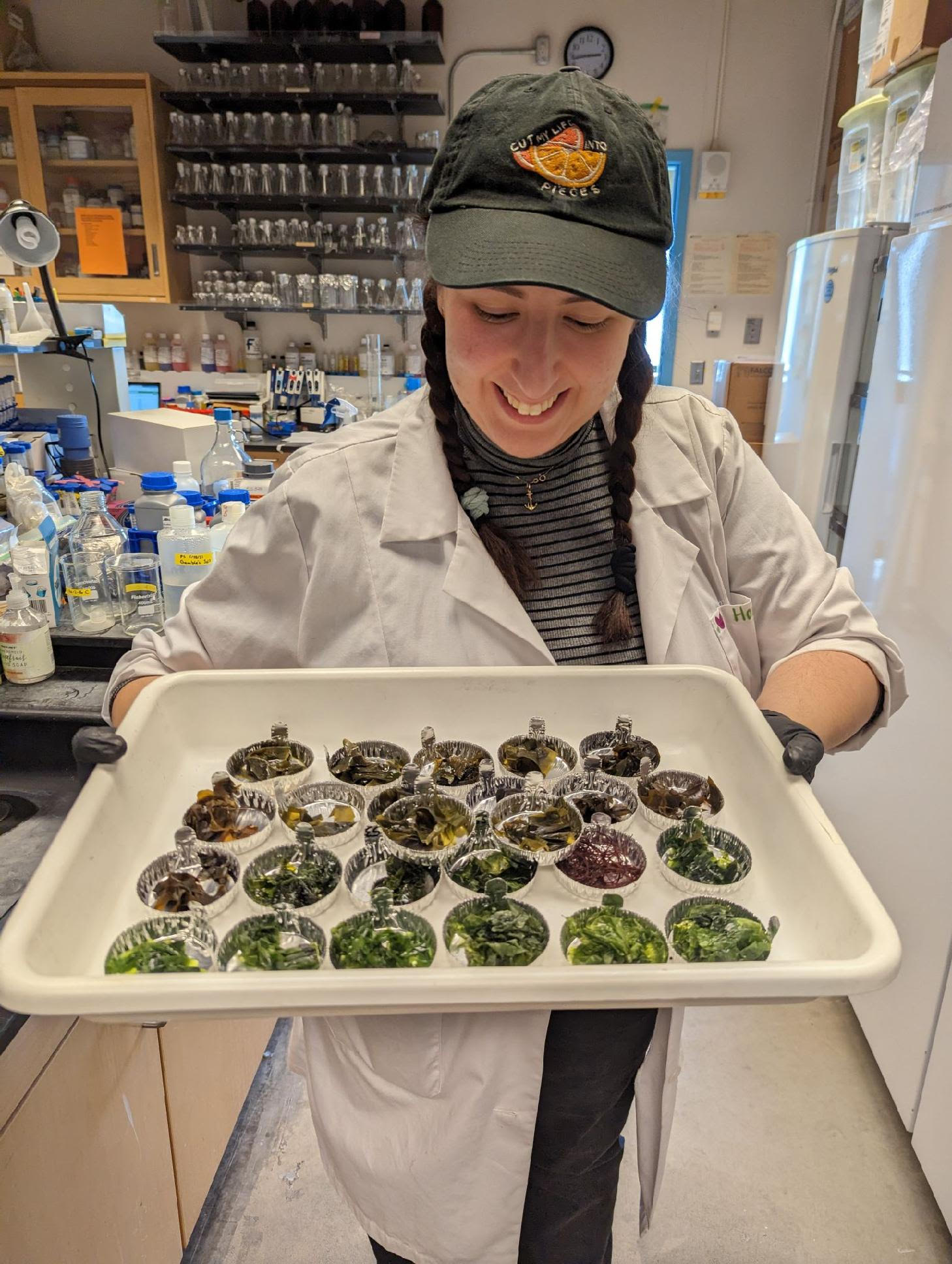
Student Profile: ESCI Graduate Student Holly Suther
Seaweed aquaculture is expanding in Washington, and people forage and consume seaweed of all types, but the pool of knowledge regarding how contaminants can accumulate within seaweed is shallow.
Holly Suther, a graduate student in the Environmental Sciences department, is researching legacy and emerging contaminants of concern in edible seaweed around the Salish Sea. Over the last year and a half, Holly has collected six seaweed species at over 14 sites around the Salish Sea. She is measuring concentrations of contaminants like Cadmium, Arsenic, Lead, and Zinc, along with Polychlorinated biphenyls (PCBs) and Per- and polyfluoroalkyl substances (PFAS). “I’m excited to be at the stage where I’m finally finished with my collections and starting to analyze the data and write up my results,” she says.
Holly plans to graduate in 2024 and hopes to find work in marine ecology and environmental science. “Something that drew me to this project and the field of environmental toxicology is how interconnected it is with all the other STEM disciplines,” says Holly. “This work allows me to apply the knowledge I learned in biology, chemistry, physics, and statistics classes throughout my undergraduate and grad school journey.” On her time in Bellingham, Holly says, “This opportunity to attend Western for graduate school has been an unexpected but welcome change in my life, and I am excited to see where it takes me!”
Research Highlights
$1.9M NSF grant will support ADEI initiatives in science: Associate Professor of Environmental Science Dr. Robin Kodner will lead a multi-university team on a new $1.9 million National Science Foundation (NSF) grant to implement ADEI initiatives within major scientific societies in government, the private sector, and higher education. The grant’s formal title, “EVOLVED: Embedding a Vision to Operationalize, Lift up, and Value Equity and Diversity in the Consortium of Aquatic Science Societies,” takes direct aim at the efforts of the collaborators to build and implement a culture within STEM-focused scientific societies that supports and welcomes a diverse community. Read more about the EVOLVED grant, the collaboration, and the three ways it will be implemented.
NSF Grant will study sea-level resilience in the face of climate change and natural disasters: With more buildings in seismic zones being affected by sea level rise, the NSF awarded a team of researchers $2.7 million over five years to assess at-risk communities in Hawai’i and elsewhere. Associate professor and chair in the Department of Environmental Studies Dr. Rebekah Paci-Green is the co-principal investigator and will lead a team of WWU graduate students examining risk perception and mitigation preferences. Learn more about the grant, the collaborators in New York and Hawai’i, and how this work could impact local communities in Washington state.
WWU to partner in $30M NSF Center for Braiding Indigenous Knowledges and Science: Associate Professor of Environmental Sciences and Pew Marine Fellow Dr. Marco Hatch will serve as co-lead for the Pacific Northwest Hub and lead a place-based study on clam gardens in the Salish Sea. The NSF Center for Braiding Indigenous Knowledges and Science (CBIKS) is an international NSF Science and Technology Center that will focus on addressing the impacts of climate change, threats to cultural places, and shifts in our food systems. Read more about the CBIKS centers' innovative, transdisciplinary approaches to focus on today's complex, evolving challenges.
College News
Thirty years of extending the College of the Environment beyond Bellingham!
The College of the Environment Salish Sea Region is celebrating 30 years of extending educational opportunities to remote communities of western Washington. Place-based classrooms are coupled with weekend field laboratories to educate students within the Pacific Northwest environments. By doing so, this allows the College of the Environment to offer one of the oldest environmental programs in the nation to students in the following locations: Everett, Poulsbo, Port Angeles, and a new certificate program in the San Juan Islands.
College of the Environment Salish Sea Region redesigns traditional classrooms to incorporate interactive technology to connect multiple classes while utilizing the natural history of the Pacific Northwest as our laboratories. This includes the unique San Juan Islands archipelago, the epic large-scale disturbance of Mount Saint Helens, and the largest dam removal to date along the Elwha River. In addition, our mix of field laboratories, GIS, eDNA, and statistics appeals to a broad spectrum of student interests. Not only do we study locally, but we also collaborate with local professionals whose expertise in the environmental field is shared while creating professional networks for our Western students. In the past 30 years, the College of the Environment Salish Sea Region has graduated over 400 next-generation environmental professionals. As we celebrate the past we also wonder – what will the next 30 years bring?
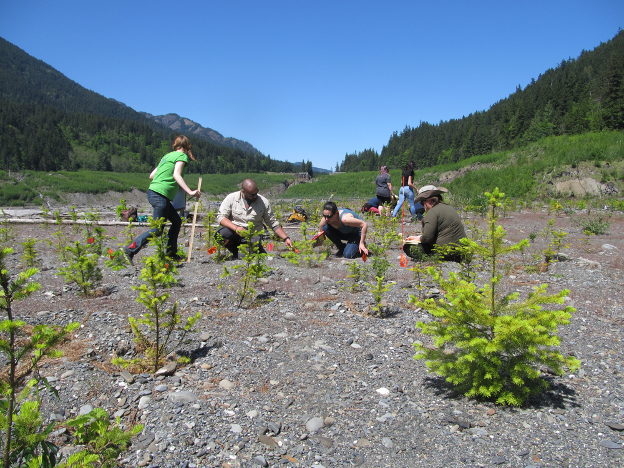
The Elwha River restoration project provides a unique opportunity for students enrolled in the College of the Environment – Salish Sea Region. With classrooms in Port Angeles, this field laboratory is literally in our own backyard! Photo by Jenise Bauman.
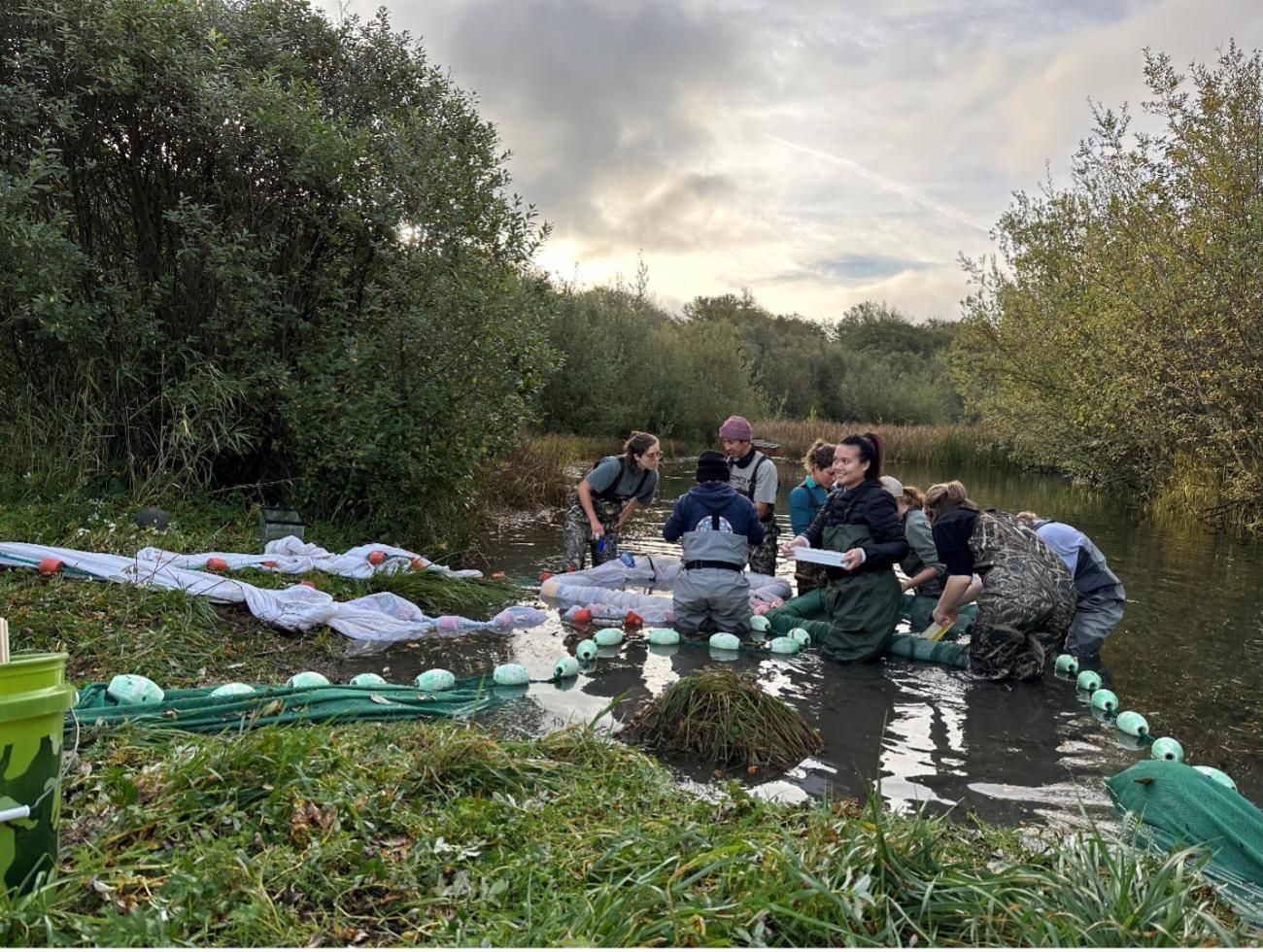
Ecological Restoration students work with the Coastal Waters Institute and Washington State Department of Ecology to learn how to identify fish species to monitor tidal wetlands and nearshore environments. Photo by Jenise Bauman.
Two new certificate programs focus on salmon recovery
Two new academic certificate programs, created in collaboration with the salmon recovery organization Nooksack Salmon Enhancement Association (NSEA), combine academic learning, hands-on training, and paid internships to prepare students to do critical work in watershed restoration and community education and engagement. Throughout the two-year program, students engage in courses to learn about current environmental issues in fisheries habitat and how best to design research, education, science, policies, and community action while participating in hands-on practicum work through paid internships with NSEA.
Salmon are an essential part of our ecosystem in the Pacific Northwest, but their populations are struggling due to urbanization and the effects of climate change. Habitat protection and restoration is one of the best things we can do to help salmon recover.
The Salmon Enhancement: Community Education Certificate is for Environmental Studies majors interested in community education and engagement in environment and sustainability. The Salmon Enhancement: Habitat Restoration Certificate provides the training and experience needed for Environmental Sciences majors interested in doing critical work in watershed restoration and community education and engagement.
Learn more info about both certificates and our partnership with NSEA at cenv.wwu.edu/nsea.
Power, Privilege, and the Environment students engage in community outreach around food security
This quarter, students in Power, Privilege, and the Environment (ENVS 467) are working with a handful of community organizations operating within the Whatcom County food system. “Environmental Studies curriculum often prioritizes examining ‘what is wrong’ in the status quo, which—although incredibly important—can sometimes leave students feeling disempowered and without hope,” said Henry Fisher, the second-year graduate student teaching the class. “Hands-on engagement with organizations working to affect tangible, meaningful change within our community has both increased my students’ awareness of the hopeful things happening around Whatcom County and empowered them to know that they are a part of those efforts.” Students split into small groups, each doing use-inspired research with a local organization:
- One group is researching alternative nonprofit structures for City Sprouts Farm, a women-owned and run urban vegetable farm in Bellingham's Birchwood neighborhood.
- Another group is helping the York Community Farm, now under the stewardship of Western’s Center for Community Learning, to help with an upcoming transition to a community garden program.
- The Whatcom Food Network (WFN) facilitated the creation of the Whatcom County Food System Plan (WCFSP), a 10-year plan designed to create a more sustainable and equitable regional food system. Two groups of ENVS 467 students are updating a “map” of organizations that form the local food web, foundational to the WCFSP’s implementation.
- The final group is working on food security issues on campus. Starting with a recent article in the Food Systems Journal by Kate Darby et al., students are gathering information about existing programs to address food insecurity and exploring new options for food sovereignty-oriented food assistance programs that could help support and more effectively address the intersectional inequities in food security students face.
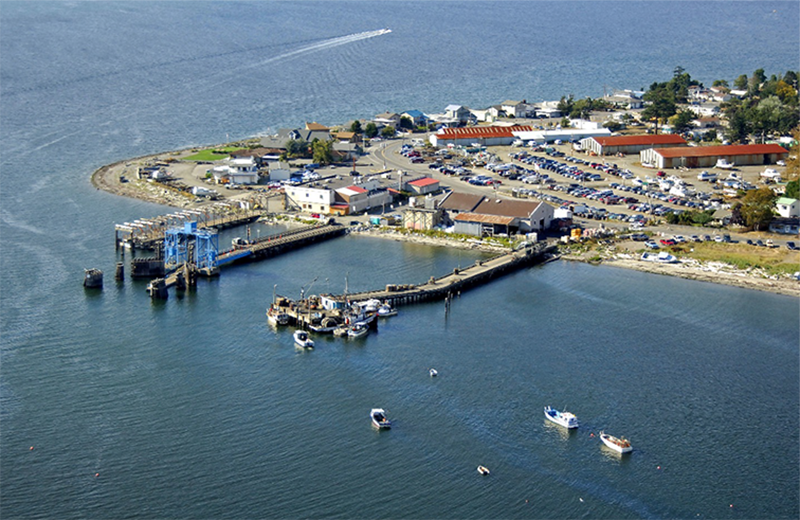
Urban Transitions Studio completes the Gooseberry Point Village Plan
In 2022-2023, the Lummi Commercial Corporation invited the Urban Transitions Studio to develop a Gooseberry Point Village Plan incorporating a marina, mixed-use development, affordable housing, and more facilities at Stommish Water Festival Grounds. The results of the year-long study are viewable in an ArcGIS Storymap.
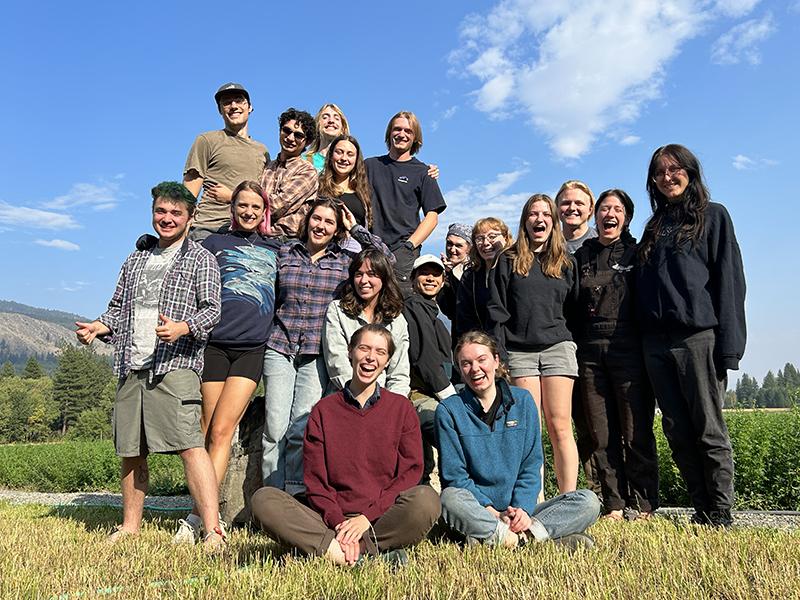
The Summer 2023 Sustainability Pathways cohort. Photo by Joshua Porter.
Sustainability Pathways fellows apply systems thinking in community-engaged projects
This summer, the fourth cohort of Sustainability Pathways students completed their 11-week fellowships in the Methow Valley. The 18 students, who represent 12 different majors, delivered community-engaged projects as the final assignment for their Sustainability Planning Studio course. The students and program partners represent interdisciplinary fields connected to sustainability, which helps students develop and apply systems thinking skills. Professional practicum experiences included town planning, ecological restoration, public health, regenerative agriculture, circular economy development, zero waste, rare carnivore research, and more. Altogether, this translates to inspiring levels of work getting done across sustainability sectors. The fellowships are funded by grants, donations, and organizational partners and provide housing and paid practicum experiences to support inclusive access and success.
Compass 2 Campus welcomes budding environmental scientists
Over 800 5th graders from regional elementary schools visited WWU on Oct. 24th for the Compass 2 Campus (C2C) kick-off tour. One stop on this tour was a visit with environmental science (ESCI) students Nic Benman, Emmanuel Keene, and Ariel Shiley to learn about herring and the research they are doing with Dr. Brooke Love. The herring team put together an entertaining and informative session for the 5th graders to learn about some forage fish basics, build a marine food web, and get a glimpse of our lab and field research. Competition was fierce for the trivia contest prize at the end, but they all went home knowing more about herring, and they all said they wanted to be scientists when they grow up!
The kick-off event is part of C2C’s mission to increase access to higher education for underrepresented students in Whatcom and Skagit counties who have been historically excluded from higher education. The program places these 5th-12th graders with trained college student mentors who support them through academic tutoring, after-school programs, and informal interactions. Over the last ten years, C2C has engaged with students from 40 schools in Whatcom and Skagit counties, and faculty and students from ESCI have been regular participants in the campus tour days, described by some students this year as “the best day ever!”
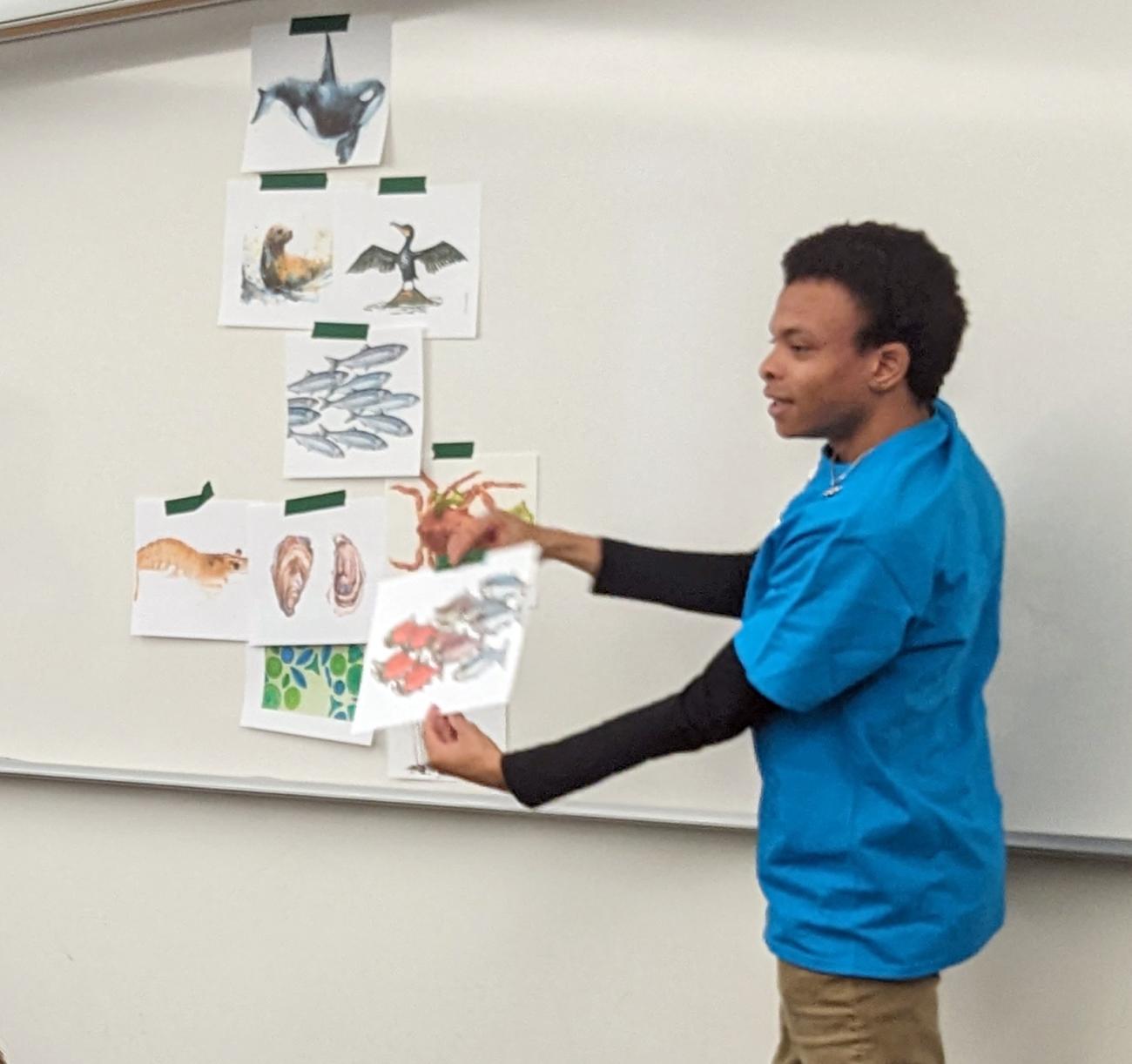
Nic Benman constructs a marine food web with the 5th graders. Photo by Brooke Love.
Urban Planning & Sustainable Development Updates
Earlier this year, the Washington State Legislature allocated $200,000 to the Urban Planning and Sustainable Development (UPSD) program of the Urban and Environmental Planning and Policy department (UEPP). The same funding was made to the state’s three accredited urban planning programs – the other two being the University of Washington and Eastern Washington University. The appropriation is provided solely “for planning student studios to assist cities and counties with planning projects. Assistance shall focus on students and supporting faculty to facilitate on-site learning with cities and counties.” This state initiative addresses a critical shortage of professionally trained planners to meet state planning needs, such as new requirements for comprehensive planning, climate change, housing affordability, and transportation, to name just a few. UPSD faculty immediately pivoted and adjusted their courses, studios, internships, and projects to answer the legislature’s call. Dr. Kamel, UEPP Chair, said, “We are glad to see that our legislators recognize the role urban planning education plays in advancing the vision of a just, equitable, and sustainable future for our state.” UPSD is currently partnering with UW and Eastern on a Universities and Communities Planning Collaborative (UCPC) to coordinate statewide efforts.
This quarter, Professor Nick Zaferatos’ Native American Planning and Natural Resources Management class engaged in applied research regarding recent amendments to the Growth Management Act (GMA). In particular, the Act now provides for the direct participation of Native American tribes in regional planning. Students are conducting a survey of tribal and county planning directors throughout the state to identify tribal interests and assess intergovernmental cooperation's status in regional planning. The amendment to the Act was preceded by Dr. Zaferatos’ two-year research investigation regarding the necessity for tribal inclusion in regional planning as tribes retain distinct treaty rights in ceded areas under state and county jurisdiction. That research led to the Washington State’s governor and the tribal leadership at a 2021 Centennial Accord conference to recognize the need and support for the inclusion of tribes in statewide planning. The leadership’s support led to the introduction of Substitute House Bill 1717 (Concerning tribal participation in planning under the Growth Management Act), which was passed by the Washington State legislature and signed into law in June 2022.
For the last three years, students in Dr. Tammi Laninga’s Land Use Regulations course have worked with cities in Whatcom County, the Methow Valley, and Skagit County to recommend climate adaptation and mitigation policies for their comprehensive plans. This work is helping cities and counties comply with new legislative requirements outlined in House Bill 1181: Improving the state’s response to climate change.
New degrees and programs
This quarter, the Department of Urban and Environmental Planning and Policy welcomes the new Food Security & Policy Minor. Food is about more than taste and nutrition; it’s also about who can afford it, who has access to it, and who has the time, energy, and facilities to prepare it. For many, getting better food is secondary to getting adequate food, water, and shelter. We have everything we need to grow, process, and distribute food, so why is there so much inequity around who has it? This minor is for students who want to promote positive change in food cultures and environments.
Also from the Department of Urban and Environmental Planning and Policy, and through the College of the Environment - Salish Sea Region, students can get a BA in Natural Resource Management. Students in this program will develop knowledge of core natural resource and environmental management, planning, and leadership concepts while acquiring hands-on experience with real-life case studies. There are two emphasis options: natural resource policy and environmental and natural resource management.
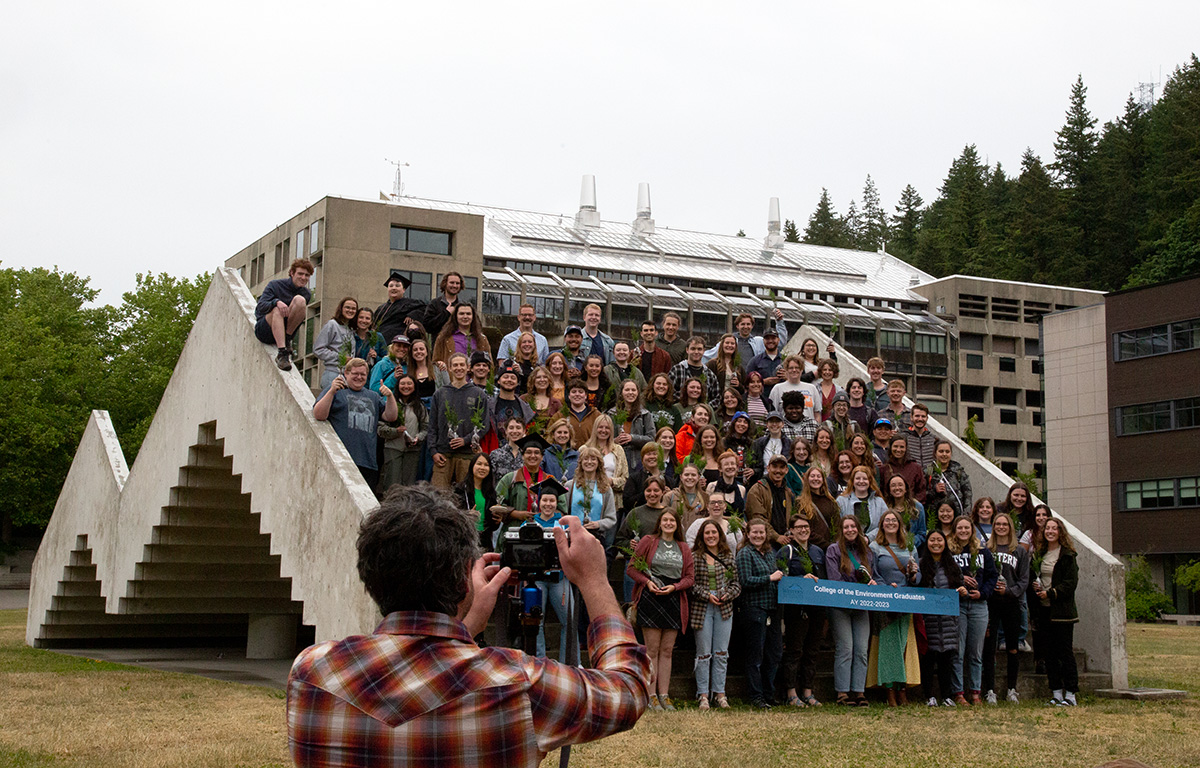
Class of 2023
Everyone say "trees"! The College of the Environment class of 2023 picked up their cedar seedlings and lined up for a class photo the day before commencement. At the end of finals week spring quarter, graduating seniors, and M.A. and M.S. candidates gathered for one last chance to mingle with fellow students, faculty, and staff and - keeping with the tradition - receive a cedar tree seedling to plant and grow into the future. If you are an alum who received a seedling at graduation, we'd love to hear how your cedar is coming along? Send us a photo?
Alums, we want to hear from you!
Are you a College of the Environment alum? If so, we invite you to complete a survey about your work experience and thoughts about how your education prepared you to address sustainability and climate change challenges.
This survey is part of a national study designed to better understand the alignment between professional practice needs and educational training. Your answers are anonymous, though after completing this survey, you have the option to enter your contact info for a chance to win a $100 gift card.
This survey will remain open through December 2023. We thank you for contributing to this important work and helping to prepare future generations of environmental leaders.
Events
Toxicology & Societies Speaker Series
The monthly Toxicology & Societies Speaker Series is presented by the WWU Institute of Environmental Toxicology and Chemistry in partnership with the WWU Alumni Association. This seminar series aims to help you better appreciate, understand, and evaluate the many ways that manufactured chemicals (more than 300,000) interact with all humans on Earth. Hosted by Dr. Ruth Sofield and Dr. Tracy Collier. Talks are held free and open to the public.
Fall 2023 topics include mining risks to salmon watersheds, toxicology of everyday consumer products, and environmental justice.
Check out this archive of past Toxicology & Societies Speaker Series talks.
Environmental Speaker Series
The Environmental Speaker Series presents topics of environmental concern for the WWU and Bellingham communities and is brought to you by the College of the Environment in partnership with the WWU Alumni Association.
Talks are held each Thursday at 4:30 p.m. in Academic Instructional Center West, room 204, and on Zoom. They are free and open to the public.
Watch archived talks and sign up for a mailing list to hear about the weekly talks.
Ocean Acidification and Marine Food Webs in the Salish Sea
Associate Professor and oceanographer Dr. Brooke Love will discuss ocean acidification, how the changing chemistry affects sea life, and how people and policymakers are addressing these changes.
Tuesday, Nov. 28, at 7 p.m. at Bellingham’s Old City Hall. More info and registration for this North Cascades Audubon Society event at the Whatcom Museum.
Art and science meet at MoNA
The Museum of Northwest Art (MoNA) in La Conner is showing Surge: Mapping Transition, Displacement, and Agency in Times of Climate Change. The artwork in this exhibit brought together artists and environmental researchers and educators, including Environmental Science’s Dr. Andy Bunn and Dr. John Rybczyk, to present new perspectives on the effects of climate change.
MoNA’s Outside In educational gallery’s Transition, Adaptation, and Action in Padilla Bay is an interactive installation that helps museum visitors experience the lush life of an eelgrass meadow and the unique ecosystem at the Padilla Bay Reserve. This exhibit is a collaboration between artist Helena Sarah Richardson, Padilla Bay National Estuarine Research Reserve, Environmental Science’s Dr. Brooke Love, and David Frye from WWU’s SciTech, and includes art created by young visitors to Padilla Bay.
Both exhibits are up through Jan. 21, 2024.
Publications
Student & Faculty Publications
Students and faculty have been busy publishing their work. Browse for more publications on CEDAR.
A Cascade River Ethic, Olin E. (Gene) Myers Jr., faculty publication
Weaving Fragmented Lands Together: Perspectives on a National Framework for Landscape Conservation, Jaimie Baxter, M.A., Environmental Studies thesis
Coupling Unoccupied Aerial System Surveys and Elevation Measurements to Predict Native and Nonnative Eelgrass Cover in Padilla Bay, Jacqui Bergner, M.S. Environmental Sciences thesis
What are our plans missing? What are our missing plans?, Vivien Coop, Environmental Studies senior project
Who’s Nature? Ontological Narrative Dissonance Among Skagit River Fishery Coalitions, Jann Eberharter, M.A., Environmental Studies thesis
Glacial loss and threatened fish: The future of Mount Rainier’s cold-water Bull Trout habitats, Kathleen C. Ewen, M.S. Environmental Sciences thesis
Learning from Traditional Ecological Knowledge: Paralytic Shellfish Toxins in Butter Clams, Jackelyn Garcia, M.S. Environmental Sciences thesis
Impact of Riverbank Lupine (Lupinus rivularis) on Grand Fir (Abies grandis) Ectomycorrhizal Symbioses, Andrew Labay, M.S. Environmental Sciences thesis
Dendrohydrological Reconstruction of North Fork Nooksack River August Streamflow from Subannual Mountain Hemlock Ring-Widths, Cascade Mountains, Washington State, Hannah LaGassey, M.S. Environmental Sciences thesis
CENV in the Media
New NSF Grant to Study Sea-Level Resilience in the Face of Climate Change and Natural Disasters. Rebekah Paci-Green is co-principal investigator on a $2.7 million NSF award to research how earthquakes affect buildings already damaged by saltwater in low-lying coastal areas. Western Today
Hands-on learning with an eye toward the future. The Sustainability Pathways Fellowship gives students an opportunity to spend a summer in Methow Valley getting practical, hands-on experience working with a local organization in a supportive cohort learning environment. The 18 students who made up this summer's cohort worked on projects ranging from cultural lands case study, establishing a seed library, identifying options for reducing pollution, and more. Methow Valley News
WWU to partner in $30M NSF Center for Braiding Indigenous Knowledges and Science. Researchers from Western Washington University (WWU) will be partners in a new Center for Braiding Indigenous Knowledges and Science (CBIKS) – a five-year, $30 million international NSF Science and Technology Center based at the University of Massachusetts Amherst. The center will focus on connecting Indigenous knowledges with mainstream “Western” sciences to address some of the most pressing issues of our time in a new way. Nature; WBUR; On Point
Is Bellingham a Heat Island? How can cities keep cool as global temperatures rise? Urban and Environmental Planning and Policy Chair Nabil Kamel suggests a multi-pronged approach that includes increasing tree canopy but also integrates urban planning, urban design, land use, and transportation. Bellingham Herald
Salish Sea Atlas selected as best map series. The “Climate of the Salish Sea Bioregion” chapter of the Salish Sea Atlas was selected as one of the best map series at the 2023 ESRI User Conference. The “Climate” chapter explores the wind, precipitation, and temperature characteristics of the Salish Sea bioregion using data averaged for the 1991-2020 period. The Salish Sea Atlas is a comprehensive, open-access digital book containing maps, illustrations, interpretive text, and downloadable geospatial datasets. Western Today
13 WWU Students Receive Award in EPA's 2023 Environmental Justice Video Challenge. A group of 13 Western Washington University students – as well as two students from the University of Washington – received an honorable mention award in Phase 2 of the Environmental Justice (EJ) Video Challenge for Students through the United States Environmental Protection Agency (EPA). Western Today
“Unstable Properties” wins award. Dr. David Rossiter co-authored “Unstable Properties,” which highlights the unstable ideological foundation of land and title arrangements in B.C., received a third-place award at the British Columbia Historical Federation's 2022 Lieutenant Governor's Historical Writing Awards: B.C. Historical Federation
Environmentalists find fewer microplastics "than expected" on Bellingham Beach. Recent Environmental Sciences grad Hannah Miller worked with the nonprofit RE Sources to organize a volunteer collection event. Cascadia Daily News
‘Watermelon snow’ piques curiosities in Utah after abnormally wet winter. Dr. Alia Khan explains the connection between snow algae, glacial melt, and climate change. AP News
Algae blooms increase snowmelt in the Pacific Northwest by 20%. Clean snow reflects as much as 99% of incoming solar radiation, helping to protect Earth's atmosphere from warming. Results of Dr. Alia Khan’s new U.S. NSF-supported study show that algae blooms commonly grow on snow in the Pacific Northwest, usually red or pink, causing the albedo, or reflectivity, of the snow to decrease by about 20%. National Science Foundation
The Planet Magazine, an award-winning student-run quarterly environmental publication dedicated to environmental advocacy and awareness through responsible journalism, is online. The magazine has been independently produced by Western Washington University students since 1979. The Planet Magazine